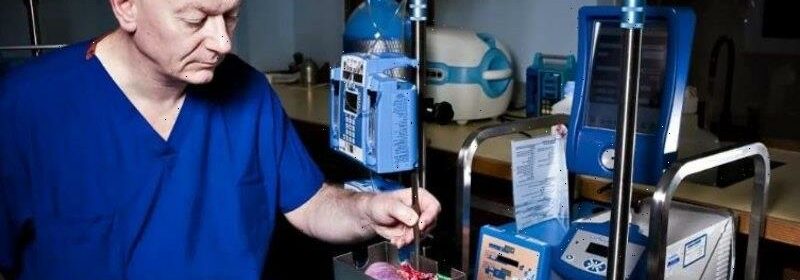Medical breakthrough converts organ to universal blood type for transplants

London: The blood type of a human kidney has been changed for the first time in a medical breakthrough that could help people on transplant waiting lists.
A person in need of a kidney can spend several years on dialysis waiting for an organ, however this is much longer for ethnic minorities as a result of a lack of donors.
Professor Mike Nicholson from Kidney Research UK.
In Britain, just one in every 11 organ donations in 2020 to 2021 came from black, Asian and minority ethnic donors despite making up a third of the waiting list.
But a team from the University of Cambridge have now found a way to make all kidneys into type O – the universal donor blood group.
The researchers believe this could allow for more equitable access to transplants as procedures would not be constrained by blood type.
They reached their conclusions after treating three human kidneys, kept artificially alive, with a chemical cocktail for five hours.
The key ingredient was an enzyme that acts like a pair of “molecular scissors” and shears off the antigen markers that identify the organs as type B.
By clearing the organ of these markers, the enzyme reverts back to its default state, akin to type O.
“One of the biggest restrictions to who a donated kidney can be transplanted to is the fact that you have to be blood-group compatible,” said Professor Mike Nicholson.
“The reason for this is that you have antigens and markers on your cells that can be either A or B. Your body naturally produces antibodies against the ones you don’t have.”
Researchers working on the project are unable to say when the procedure can be widely adopted in practice, with several regulatory and ethical questions still to be resolved, but say this technological advancement will have seismic implications going forward.
“By taking B-type human kidneys and pumping the enzyme through the organ using our normothermic prefusion machine, we saw in a matter of just a few hours that we had converted a B-type kidney into an O type,” said study author Serena MacMillan.
“It’s very exciting to think about how this could potentially impact so many lives.”
A patient known as Ayesha, who suffers with chronic kidney disease, needs a transplant but was told by consultants she may have to wait up to 10 years,
“They explained that because of my ethnicity, my wait for a deceased donor will be longer than for a white person,” she said.
“The reason being my background – being the Muslim community and other faiths and cultures often don’t agree to be organ donors.
“I feel sad at the thought of waiting so long for a transplant, I understand a transplant isn’t a cure, but it would make my body a lot stronger and give me a second chance at a healthy life.”
Dr Aisling McMahon, executive director of research at Kidney Research UK said: “It is incredibly impressive to see the progress that the team has made in such a short space of time and we are excited to see the next steps. As an organisation, we are committed to funding research that transforms treatments and tackles health inequalities.
“We know that people from minority ethnic groups can wait much longer for a transplant as they are less likely to be a blood-type match with the organs available.
“This research offers a glimmer of hope to over 1000 people from minority ethnic groups who are waiting for a kidney.”
The pioneering project has been accepted for publication by the British Journal of Surgery and will be released in the coming weeks.
The Telegraph, London
Most Viewed in World
From our partners
Source: Read Full Article
